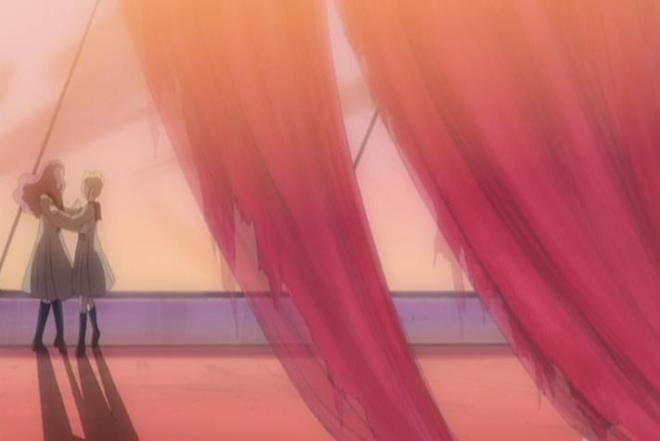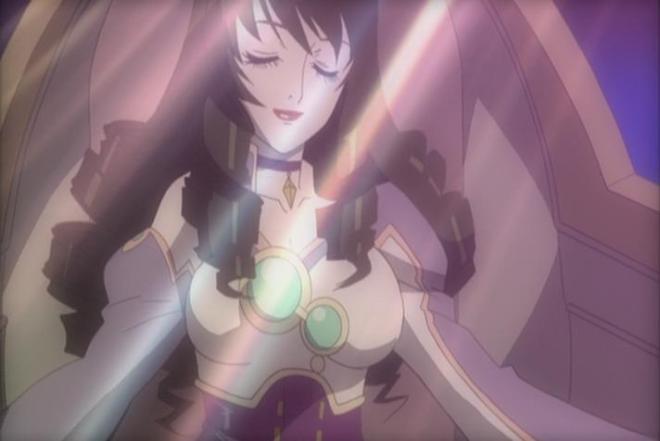 Seeing as I had no confidence in the summer season, I decided to invent a backlog of shows to watch from one of three different areas. First up is Simoun, a series that aired back in the spring and summer of 2006, and was a show that I had previously dropped. I went back and marathoned it, and these are my thoughts on it.
Seeing as I had no confidence in the summer season, I decided to invent a backlog of shows to watch from one of three different areas. First up is Simoun, a series that aired back in the spring and summer of 2006, and was a show that I had previously dropped. I went back and marathoned it, and these are my thoughts on it.
When Simoun began airing in the spring of 2006, I was at an interesting point in my life. I was a month off from graduating from college, and part of my attention lay at finding a job and the upcoming World Cup to be held in Germany. I was also trying to do well in my classes so I could graduate with just a little confirmation that I wasn’t totally average at this.
As far as the anime scene was concerned, this was the beginning of an explosion in the amount of anime that would be broadcast. Satellite broadcasters made it possible to get more than just a few shows on air at a time, and they were not restrained by the regional nature of releases in the past. One could say this was the start of a Golden Age that ended as soon as the Onii-chan incest shows began populating the schedule.
With those two things in mind, I went into the season wondering how I could watch so much. I think I dropped the first episode of this show on the basis that it seemed like too much fanservice (ironic since I watched Haruhi at the time), and that I didn’t have enough time to watch more than just a few shows.
 So I went back and revisited this thanks to the random number draw and came back with mixed feelings. Simoun is really a show that takes place in two different times, but it takes a long time to get to that understanding and it simply would not have worked if this show was compressed into 13 episode chunk(s). Along the way, the one thing I can definitely say is that it never got to grips with the ambiguity of war, but I don’t think that’s a major flaw in any case.
So I went back and revisited this thanks to the random number draw and came back with mixed feelings. Simoun is really a show that takes place in two different times, but it takes a long time to get to that understanding and it simply would not have worked if this show was compressed into 13 episode chunk(s). Along the way, the one thing I can definitely say is that it never got to grips with the ambiguity of war, but I don’t think that’s a major flaw in any case.
I have to start with the one big contrivance this show makes in developing it’s characters. All people born in this universe are female until they head to the Spring after age 17 to choose which gender they really want to be, or it can be chosen for them. Adulthood effectively becomes an instant event that never seems to be anything other than sad. However, there are groups of girls that do not have to make this choice immediately while they pilot mysterious flying machines called Simouns. The series focuses on one group, Chor Tempest, and their battles against the enemy.
The key theme running through Simoun is the idea of making the ultimate decision. New characters come in to Chor Tempest early and want to choose the head priestess Neviril as their pair to pilot a Simoun, but she doesn’t want to pilot again until she is ready. Then there are the frequent decisions of characters to go off on missions on their own like it’s Star Trek with mysterious priestesses.
There are also a few ideas which seem to get dropped throughout the series. There are a couple of “horrors of war” moments; the protagonis Aaeru having to cut a dead man’s hands from the controls of her Simoun, and Floe making friends with someone who would come to see her as a tool of mass destruction being the ones to come to mind, but those are quickly dropped in the 2nd half of the show. By that point, it turns into a dead character of the week series and then a time-travel show.
 Although it becomes a bit of a narrative mess at the end, I think the main theme of the show shines through in the final acts of the series which really starts to take off once the youngest character Limone and Dominura make a decision that takes them out of the story. From that point, it becomes about each character making decisions that will most make them happy. By that point I felt that the show had done enough to earn the right to downplay the major diplomacy failures that were going on in the background.
Although it becomes a bit of a narrative mess at the end, I think the main theme of the show shines through in the final acts of the series which really starts to take off once the youngest character Limone and Dominura make a decision that takes them out of the story. From that point, it becomes about each character making decisions that will most make them happy. By that point I felt that the show had done enough to earn the right to downplay the major diplomacy failures that were going on in the background.
So to sum up my thoughts on the series, I think it actually turns out to be a great companion piece to a show like RahXephon as the mood is similar in the end. The characters are well-developed to the point where it is depressing when any of them are killed after appearing in even just a single episode. The major failings have to do with the war aspects that keep them fighting, and I think they were too quick to abandon making the girls into villains to some in favor of half-baked background politics. Plus, don’t get me started on the captain joining the final battle.
Overall, it’s well worth watching and I’d strongly recommend it to anyone, even if they are not fans of the necessary yuri overtones this series requires in its concept. I’d even go as far as to say its the best show I’ve seen to date this year.
Next Week: Franz Ferdinand, a look at the fashion industry and the early days of noitaminA